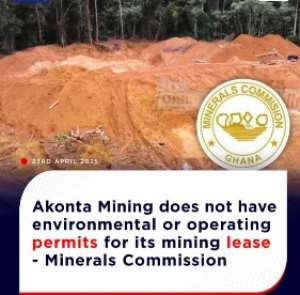
Ghana’s mining sector has long been plagued by regulatory loopholes, political interference, and environmental destruction. At the center of one of the nation’s most contentious mining scandals is Akonta Mining, a company accused of subleasing concessions, receiving payments in gold, and illegally operating within protected forest reserves. Despite regulatory intervention and public outrage, evidence suggests a pattern of criminal evasion, financial collusion, and environmental degradation that demands urgent accountability.
The Subleasing Controversy: A Web of Illicit Deals
According to the Minerals Commission, Akonta Mining has engaged in subleasing concessions, a practice that raises concerns about compliance with Ghana’s Minerals and Mining Act, 2006 (Act 703). Official records indicate that Akonta Mining applied for three separate mining leases in 2021, none of which were ratified. Despite lacking the necessary permits, the company allegedly sold mining access to third parties, collecting royalties while bypassing regulatory oversight.
Investigations have revealed that Akonta Mining’s subleased concessions were handed over to individuals operating under false pretenses, with payments made in gold rather than formal currency transactions. This shadow financing model enables companies to evade tax obligations and launder profits from unauthorized mining.
Payments in Gold: A Mechanism for Evasion?
Transactions conducted in gold introduce complexities in tracking financial exchanges. Without proper auditing mechanisms, companies can evade scrutiny, avoiding tax obligations while leveraging Ghana’s rich mineral resources for unchecked profit. Reports indicate that Akonta Mining has used this method to facilitate under-the-radar payments, raising concerns about potential money laundering, tax evasion, and undisclosed beneficiaries.
Destruction of Forest Reserves: The Environmental Toll
Satellite imagery and environmental assessments reveal significant degradation of forest reserves tied to Akonta Mining’s activities. The Tano Nimiri Forest Reserve, a protected biodiversity zone, has suffered extensive deforestation, water pollution, and soil degradation due to illegal mining operations.
The Minerals Commission’s official report confirms that Akonta Mining never obtained a forest entry permit, yet its agents were found actively working within the reserve. The destruction of these reserves poses long-term threats to ecosystems and the livelihoods of communities reliant on them.
Legal and Political Ramifications: A Culture of Impunity
Despite clear violations, Akonta Mining has filed lawsuits demanding GHC 20 million in damages, alleging defamation and wrongful shutdown. Legal experts argue that these claims attempt to shift focus away from the underlying violations. Meanwhile, political figures—including Chairman Wontumi—have inserted themselves into the narrative, alleging persecution while evading direct responsibility for Akonta Mining’s actions.
The Minerals Commission has refuted Akonta Mining’s claim of possessing a valid lease, stating unequivocally that the company has no legal lease, environmental permit, operating permit, or forest entry permit.
Call for Immediate Prosecution
The Honourable Minister for Justice and Attorney General, Dominic Akumperi Ayeni, must act decisively to prosecute Akonta Mining and its affiliates without delay. The evidence is overwhelming:
Illegal mining operations within protected reserves
Subleasing concessions without regulatory approval
Payments in gold to evade financial scrutiny
Environmental destruction with long-term consequences
Failure to prosecute would signal a dangerous precedent—one where political connections override justice, and environmental destruction is ignored in favor of short-term gains. Ghana’s legal system must demonstrate that no individual or company is above the law, ensuring that Akonta Mining faces the full weight of legal consequences.
The Path Forward: Demand for Accountability
As investigations unfold, Ghana faces a critical decision: will political interests override environmental justice, or will systemic reforms ensure accountability? Strengthening regulatory oversight, enforcing penalties, and promoting transparent financial disclosures are essential to curbing illegal mining practices.
Key recommendations include:
Enforcing Satellite Tracking for Mining Concessions – Real-time monitoring to prevent unauthorized operations.
Revamping Judicial Processes for Mining Violations – Fast-tracking cases to prevent prolonged legal evasion.
Strengthening Transparency in Lease Allocations – Publicly accessible mining agreements to prevent fraudulent claims.
Without decisive action, Akonta Mining’s case could set a dangerous precedent—one where environmental destruction is ignored in favor of short-term gains.
Retired Senior Citizen
Teshie-Nungua
[email protected]


